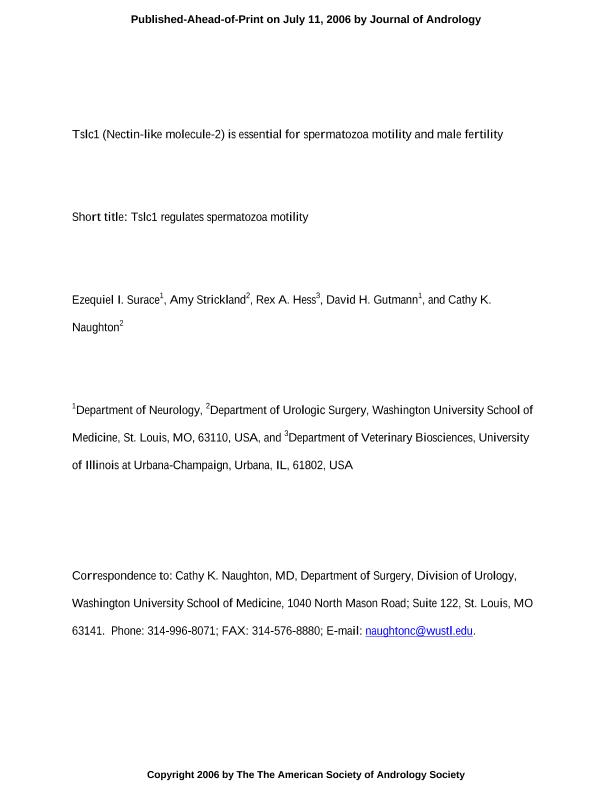Artículo
Tslc1 (nectin-like molecule-2) is essential for spermatozoa motility and male fertility
Fecha de publicación:
11/2006
Editorial:
American Society of Andrology
Revista:
Journal of Andrology
ISSN:
0196-3635
e-ISSN:
939-4640
Idioma:
Inglés
Tipo de recurso:
Artículo publicado
Clasificación temática:
Resumen
The nectin-like molecule-2 (TSLC1) is a cell-cell adhesion molecule expressed in testicular germ cells. To directly examine the role of Tslc1 in male fertility, we generated Tslc1+/-mice that have greater than 90% reduction in Tslc1 expression. Tslc1+/- males exhibited reduced fertility and rarely transmitted the Tslc1 mutant allele, whereas Tslc1+/- females were consistently able to transmit the mutant allele. Histologic and electron microscopic analyses of the testes in Tslc1+/- mice demonstrated disruption of the junctional scaffold between germ cells and Sertoli cells. Reduced Tslc1 expression had no effect on germ cell proliferation or apoptosis. While evidence of normal spermatozoal maturation was supported by Fluorescence Activated Cell Sorting (FACS) analysis, spermatozoa from Tslc1+/- mice demonstrated markedly reduced motility without compromised viability. Collectively, these results establish an essential role for Tslc1 in spermatozoal maturation and motility, distinct from other members of the nectin family.
Palabras clave:
Igsf4
,
Spermatogenesis
,
Spermiogenesis
,
Syn-Cam1
,
Testis
Archivos asociados
Licencia
Identificadores
Colecciones
Articulos(IIBBA)
Articulos de INST.DE INVEST.BIOQUIMICAS DE BS.AS(I)
Articulos de INST.DE INVEST.BIOQUIMICAS DE BS.AS(I)
Citación
Surace, Ezequiel Ignacio; Strickland, Amy; Hess, Rex A.; Gutmann, David H.; Naughton, Cathy K.; Tslc1 (nectin-like molecule-2) is essential for spermatozoa motility and male fertility; American Society of Andrology; Journal of Andrology; 27; 6; 11-2006; 816-825
Compartir
Altmétricas




